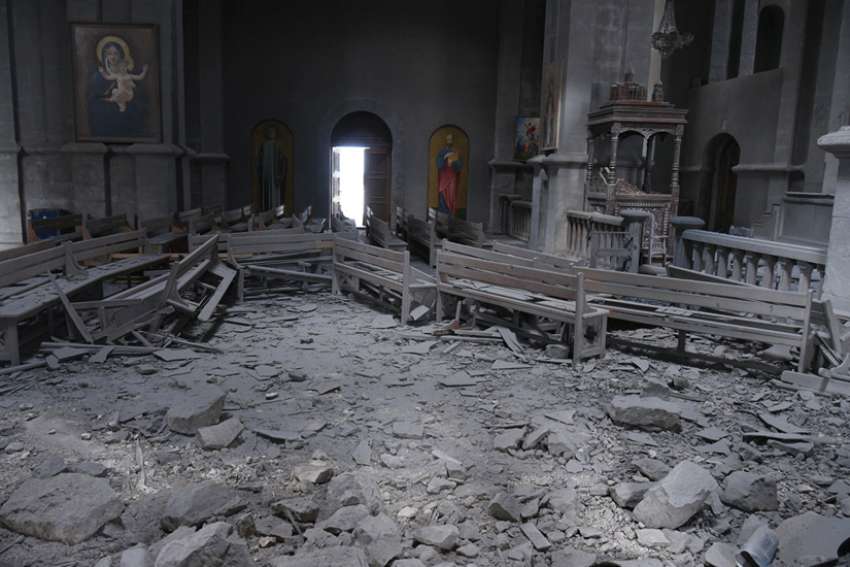In September Project Ploughshares revealed that laser target acquisition technology manufactured by Burlington, Ont.’s L3Harris Wescam was likely being fitted onto Turkish drones which have been sold to Turkey’s ally Azerbaijan. Azerbaijan appears to have been using the drones to pick out schools, hospitals and other civilian targets for laser bombing runs.
“So if Canada continues to export these systems, it would be obviously in breach of its obligations under both the Arms Trade Treaty, which is international law, but also domestic law under Canada’s own domestic arms controls,” Project Ploughshares researcher Kelsey Gallagher told The Catholic Register . “Canada is legally obligated to halt further exports. It’s pretty much as simple as that.”
Canada acceded to the 2014 Arms Trade Treaty June 19, 2019.
Project Ploughshares is an ecumenical project of the Canadian Council of Churches operating on the campus of the University of Waterloo. It is partially funded by the Canadian Conference of Catholic Bishops.
When Global Affairs did announce Oct. 5 it was suspending L3Harris Wescam’s export licenses while it investigates, Turkey’s foreign ministry accused Canada of a double standard.
“There is no explanation of blocking defence equipment exports to a NATO ally while … Canada does not see any harm in exporting arms to countries that have military involvement in the crisis in Yemen,” said the Turkish foreign ministry.
“When Turkey comes around and says this is a double standard, you block weapons to us but you are willing to continue exporting weapons to Saudi Arabia, I would agree with them,” said Gallagher. “We should halt exports to both countries.”
The example of Saudi Arabia also raises questions about how well Global Affairs can investigate its own decision back in May to grant L3Harris Wescam export permits to Turkey, despite a 2019 arms embargo in response to Turkey’s invasion of northern Syria. Twice, in 2017 and 2018, Global Affairs investigated Canadian exports of light armoured vehicles to Saudia Arabia in response to video evidence the small, mobile tanks were being used in the war in Yemen. Both times Global Affairs decided the exports were onside.
“It’s quite clear that these weapons pose a substantial risk of being misused, being diverted, killing civilians — quite clearly,” Gallagher said. “Other investigations have ended with Global Affairs essentially saying, ‘Our hands are clean; the substantial risk is not evident to us and we will continue selling billions and billions and billions of dollars worth of armoured vehicles to one of the most autocratic regimes on the face of the Earth…. Global Affairs’ track record of coming to a positive conclusion in these investigations in the last few years doesn’t exist.”
“It seems to me about the most fundamental principle of morality is that you can’t murder people. By murder, I mean killing innocent people,” said Regis College moral theology professor John Berkman. “For Canada to sell the weapons to a nation which intends to kill innocent people, then you are an accomplice to murder.”
Pope Francis has often excoriated the international arms trade and what he calls “the merchants of death.”
“It’s an absurd contradiction to speak of peace, to negotiate peace, and at the same time, to promote or allow the arms trade,” Francis said in a 2017 video.
He again lashed out at arms dealers in his most recent encyclical, Fratelli Tutti . “We see outbreaks of tension and a buildup of arms and ammunition in a global context dominated by uncertainty, disillusionment, fear of the future and controlled by narrow economic interests,” he wrote.
Gallagher would urge Global Affairs to seek the help of outside experts in policing arms exports.
“More interplay with civil society does have better outcomes when it comes to things like arms control. Civil society can, in a certain way, serve as a kind of second, sober thought,” he said.


